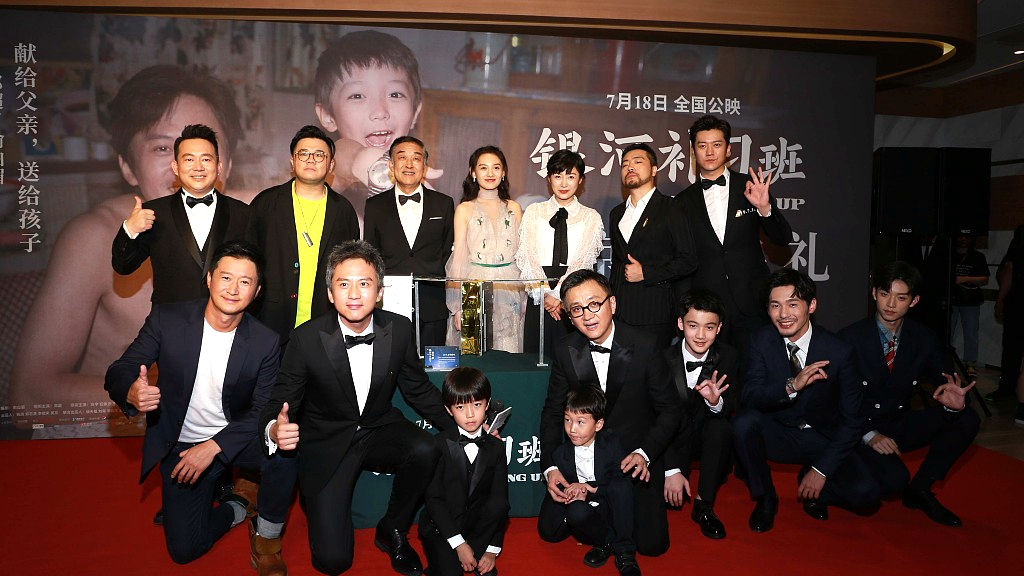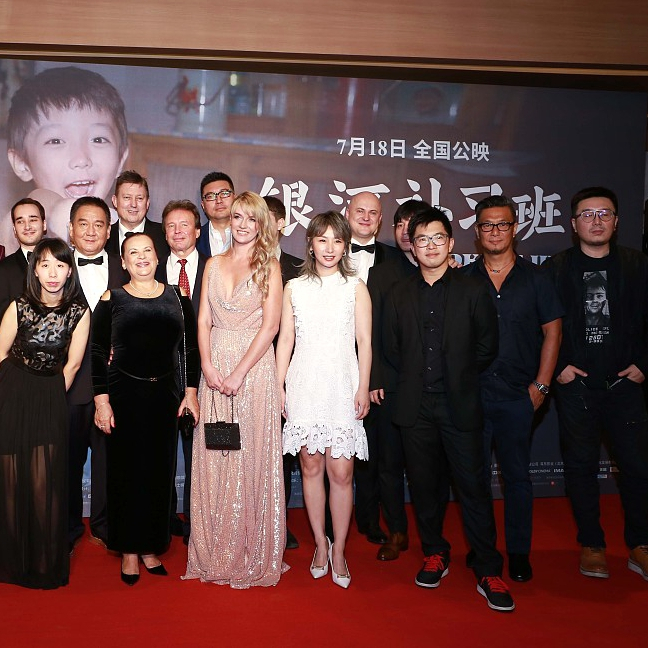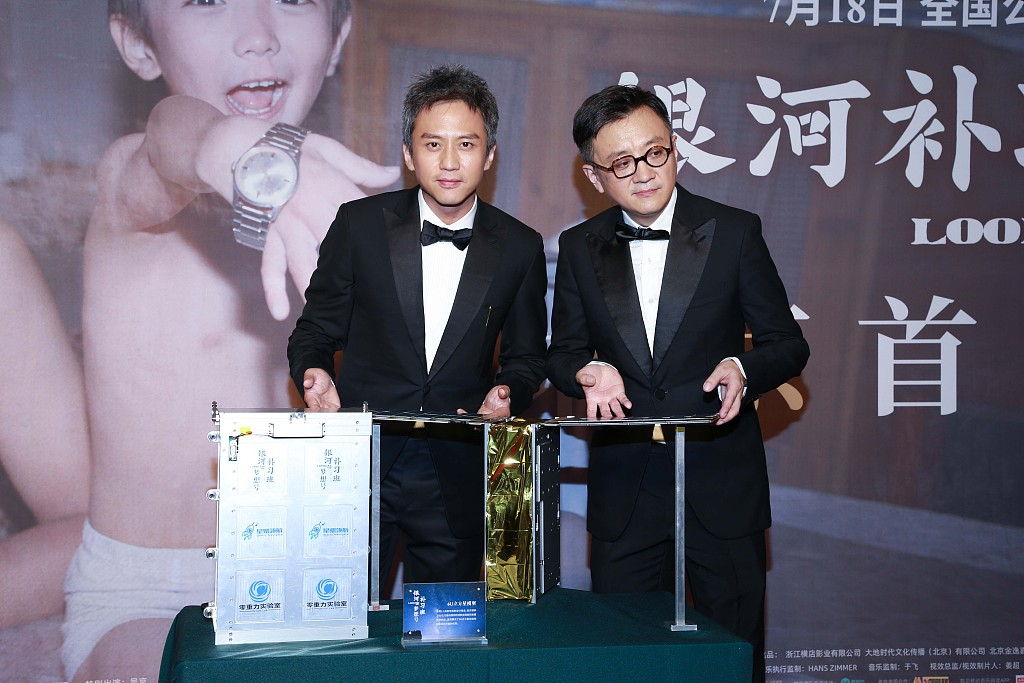
Besides financial support, what can fathers give to their children?
Thursday's release of "Looking Up" delicately portrays the relationship between Ma Haowen and Ma Fei, a father and son.
The movie stars veteran actor Deng Chao, actress Ren Suxi and three young actors playing Fei in different stages of his life.
The film shows how Fei progressively becomes motivated and confident enough to grow up into an astronaut.
The film pocketed 113 million yuan (16.44 million U.S. dollars) at the box office in its first day, and garnered a 9.4 rating score on Maoyan, a film review and ticketing website in China.
Many moviegoers shed tears at the touching and thought-provoking plot.
"I have been crying for a while," a young woman told CGTN after watching the film, "because [it reminds me of] the relationship between my father and I."
"Looking Up" stresses the importance of nourishing a strong bond between parents and their children by breaking the communication and emotional barriers that often exists between the two. The writer and director tell the father-and-son story through various themes throughout the film, here are the take-aways:
(Warning: the following analysis contains spoilers)

Premiere of "Looking Up." /VCG Photo
Trust
The movie opens with a young Fei who is often bullied by his classmates. Trust between Fei and Haowen slowly develops through the father's relentless encouragement.
"You're the smartest kid in this world," Haowen tells his son. "If you believe in yourself, you can do everything on this planet."
Fei struggles to keep up his grades to the point he's about to be expelled from school. His father then intervenes and to everyone's surprise, makes a public gambling with the school director; he bets Fei can reach top 10 of his grade level by the end of the semester.
How can Fei meet this challenge if he doesn't even believe in himself? Instead of giving mere words of encouragement, Haowen answers his son’s self-doubt in a humorous way. He says mischievously "it's was a lie to fool the director." By sharing the 'lie' with his son, Haowen creates a space for trust between each other. This, in turn, lifts the boy's spirits and motivates him to step up to the challenge.
The trust between Fei and Haowen may be non-verbal. but hat doesn't mean it doesn't exist. Fei can read his father's trust and admiration towards him through his eyes, to the degree that it makes him feel as if he was a "teenage Stephen Hawking."
The boy, to everyone else's surprise, then reaches his goal and makes the top 10.

Crews of movie "Looking Up." /VCG Photo
Critical thinking
Every country has an exam and grade-oriented education system. If there is a college, there must be a college entrance exam. Therefore, making good grades as a child is a must in order to get into a good college later in life.
Rather than rejecting the education system, the film finds a way to enrich it by offering – not a replacement – but rather an enhancement: parental education.
When Haowen asks his son what will he do for his own future and his son answers "go to Tsinghua or Peking University," the father immediately responds, "No! The universities are a process, not a goal! What would you do after university?"
To help Fei understand what he meant, Haowen takes his son out to the grassland so he may feel nature around him as described in an ancient poem referenced in the film. Haowen also takes him to the Palace Museum so he can touch and see the pieces of history. It's by 'experiencing' that Haowen teaches his son to make independent decisions and to pursue whatever he loves in life.
The point is, the real world is more complex and more flexible than multiple choice test questions. One needs to know why something should be done and what effective measures can be taken to do it. If those questions are clearly answered, then results will come naturally.
This process, which is what many parents tend to neglect, is critical thinking. Critical thinking comes prior to grades and any other goals at-large, not the other way round. It's one of the teachings Haowen instills in his son.

Deng Chao and Yu Baimei at the premiere. /VCG Photo
A wordless yet rock-solid safeguard
Fathers don't tend to express themselves much, especially with emotions. But while they lack communication, their support is constant.
In order to afford buying a computer for his son, Haowen sells his blood and works hard to earn enough money. Instead of gifting the computer and showing his emotions in a straight forward manner, he turns to humor when the boy sees the big surprise, "Wow, how great! Whose gift is this?" he asks jokingly.
Similarly, the father's wordless sacrifice is displayed again during a scene where Fei is surrounded by a bunch of hooligans who are about to give him a beating. Haowen selflessly intervenes by taking the boy's place and giving him the opportunity to run away while he takes the beating. "Just go. Don't look back," he says.
Even though Haowen never mentions the things he does for his son, the Fei understands and is fully aware of his father's selfless spirit and limitless love.
Inspired by his father's example, Fei writes him a note, "Dad, I'll be like you. I'll never surrender."
When Haowen reads the note, he doesn't utter a word. He instead hides his face behind a napkin and begins to tremble.
Mistakes
There isn't such a thing as "perfect" parents. However, the film offers an opportunity to break away from the tendency in society where parents maintain a distant and cold attitude. Communication is more important. That's the underlying message behind "Looking Up."
This is exemplified during a scene where Haowen lashes out at his son when things aren't going his way. Haowen later found the moment to apologize.
"Sorry, it's the first time I learn to be a father," he admits.
Fei, now an adult, also comes to a similar realization when he tries to persuade his father to stop trying to reverse a verdict that defamed him for many years.
"Sorry, this is the first time I've been a son."
When the same blood runs through your family's veins, mistakes are easier to forgive... as long as you aren't afraid to talk it out.
(Cover photo via VCG)

Copyright © 2018 CGTN. Beijing ICP prepared NO.16065310-3
Copyright © 2018 CGTN. Beijing ICP prepared NO.16065310-3